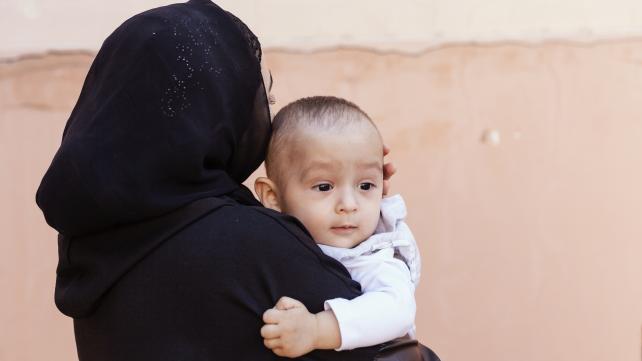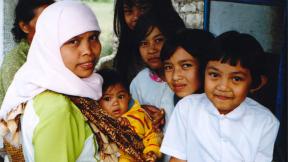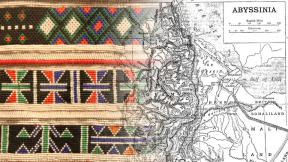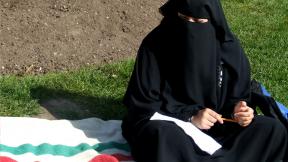
When our first child was born, my mother noticed that unlike most newborns, who clench their fists tightly, my son's hands would frequently remain open. "That means he'll be generous," my mom would say with a smile.
Generosity is what I remember most about my mother. I can't remember her refusing to help anyone, especially the poor. And in the small town in Pakistan where I was born and raised, poverty was the lot of most people.
She wasn't from a wealthy family, but she was better off than most. However, I think what made her feel for those in need was her relationship with God and her mother's background. Her mom was born into a despised caste whose existence remains mired in poverty. My maternal grandmother was a Dalit or an untouchable, an outcast in the Indian caste system.
My mother's generosity didn't consist of making online credit card payments to charities from the luxury of an air-conditioned office. I remember her standing over the burning stove in the sweltering above 110 degree plus heat cooking not just a meal for her growing family, but for the neighborhood poor. She would then hand me the pot to take to the mosque a few blocks away where the hungry would sit together in the evenings and eat their only meal of the day. Our family would not eat until this carefully prepared food was delivered first. I knew other mothers of the neighborhood also did that, thus becoming the supply chain of these informal soup kitchens operating from mosques to feed the poor and the homeless of our town.
She even turned her love for gardening into a mission to feed the poor. She would work by herself with her own hands minus many of the fancy tools and gloves we use today. My mother would grow a variety of vegetables instead of flowers and grass in her yard. She would plant in a way that she could harvest throughout the long-growing season. She would give away the produce to whoever needed it or asked for it. She did have a jasmine vine, her preferred flower. Whenever I feel a bit depressed, I visualize her standing next to that vine, comforting me and encouraging me to continue doing good deeds. Whenever I saw my mother, I remembered hadith about mother and Jannah underneath her feet.
Food wasn't the only way she exercised her generosity. I remember once returning to my home late one night from work, to find a family of four strangers sleeping in my living room. I was surprised and a bit upset. But I knew it had to be my Mom's doing. She invited those poor strangers to spend their nights in our small house during that blustery winter. Our home would remain open for any in need of help or shelter (and I mean literally open. It was only locked when we all left town for vacation. Most of the time, even the doors were not closed). Strangers and the poor were almost always be present. Many times I would come back from school to find a new person at our place.
Some strangers would become regulars. My sisters, brothers and I would call them auntie or uncle as a token of respect and our parents' concern for them.
Among the poor were many "undocumented people," to borrow a term from our time. Sakina was one such economic migrant living in a hut, which popped up in a close by property that the city had designated for a public park. While the municipality wanted to throw them out, my Mom would always welcome them into her home, to the distaste of some of our neighbors.
Sakina was one of the many women whom we used to call "auntie" in consideration of our mom's friendship with her. She was an older lady who was married to a much younger man. She and her husband were a part of an Indian migratory tribe who had wandered into our town in Pakistan. We did not understand their language. But she would sit with my mom telling her all sorts of things and somehow my mom would understand. She would listen to her painful stories and cry with her. She would shelter her, feed her, and sympathize with her. She became her mentor, therapist and banker, although my mon was younger than her.
I don't know how but we later found out that Sakina's husband used to beat her. That was our first encounter with domestic violence. It prompted my siblings and myself to engage in a swift boycott of her husband's vending business. That was our first boycott of any sort.
Sakina was just one of many people my mother offered her shoulder to cry on, her ears to listen to and her resources to assist financially.
When my mother felt something was important, this woman of few words would make every sacrifice necessary for it. For me, this was best reflected in her search for her mother and brothers, who, along with tens of thousands of others, were "lost" during an Indian military attack in her hometown in the late 1940s. .
Determined to find her mother and missing siblings, she took me, her only child at that time, to walk miles from institution to institution, office to office, to search for them. I was in fifth grade then, and unlike my own fifth grader now, I had no idea about the advertisement industry to think of placing and advertisemnt to look for my grandma and uncles through the media. My mom probably didn't know either. But her engaging in this quest was no small feat for a woman with only an eighth-grade education living in a small, conservative Pakistani town.
For three months, we searched, following any lead we could find. We asked in homes for the elderly, hospitals, anywhere and everywhere we could think of. Where there were institutions that kept written records of pensions and patients, we pored over them, searching for my grandmother.
We never did find her. My mother kept the pain of this separation hidden, but at times when she would sit alone in her bedroom reading the Quran, I'd see tears well up in her eyes, and of course I knew why. I still carry my mom's pain in my heart.
Possessions meant little to her, but there was one that she always kept with her: a copy of the Quran that her father had given her. She would turn to it regularly for comfort and guidance.
I remember how she would sit or stand next to my bed early in the morning, while I was still asleep, reading the Quran or offering her Salat (prayers). She would look so beautiful, in her large, white scarf (dupatta) wrapped all around her, calmly focused, looking down, lips silent but moving. My loving Mom always looked more beautiful when she was in prayer. Many times I'd be awake but would just keep watching her with eyes half-closed so she would not be distracted. Thank you mom for praying next to my bed. (When I see my wife sometimes praying next to our son's bed, I think of my mother and wonder if this is some secret recipe of Pakistani moms to control their boys. Probably the only non-spicy recipe in their arsenal :)
Teaching the Quran was a top priority for her and this was not only in regards to her children, but to all of the non-schooled girls of her neighborhood as well. They would come daily to learn how to read the Quran from my mother. This was the only formal education many of them ever attained at a time and in a place where women's education was focused almost exclusively on domestic training. No wonder that in terms of basic literacy, Pakistani women are ahead of men although they lag far behind in formal education.
I thank God for my mother.
I love you Ammi.
I never came around to saying that to you when you were alive.
I know that if I had your response would be: "you have become American!"
But my mom would never have said that. She would just smile and look at you in a way that you could figure out what she meant by yourself.
In my mom's culture, we would show love through so many gestures and manners, but would not express our feelings in words so direct.
In many cultures, expressing feelings in words is considered cheapening the emotions involved. That is what I feel about this article. I will never be able to master a vocabulary whereby I can craft a true portrait of my mom.
I was unable to attend her funeral. By the time I arrived from the US, she was long buried. I was told hundreds of people showed up with no public announcement to pray for her and remember her as she was laid to rest on a wintry evening in 1984. It must have been all of the aunties and their children since she had no relatives in that town.
When I finally reached home thousands of miles away from Chicago, there was a pile of condolence letters which I sat reading. One of them included a saying of the Prophet Muhammad: You can still serve your parents after they have passed away. Keep doing good deeds. The reward will be counted in your parents' favor as well. Allah's peace and blessing be upon the Prophet.
I remember this often when on the many days I remember her and continue to try to implement it. May Allah accept my good deeds and may they be a way to benefit my beloved mother in the Hereafter. Ameen.
Photo Attribution: Sonia Sevilla - http://commons.wikimedia.org/wiki/File:Iranian_alone_woman_-_sited_near_Mohammad_Al_Mahruq_Mosque_-_Nishapur_1.jpg








Comments
Remembering my mother
Amazing insight to a great lady! May her story inspire others to spread generosity around the world.
Location
Best article about my nani
Best article about my nani
Location
may Allah bless all mothers with aljannah and may He in His infinite mercies make me a mother too,amin. Keep up the nice job!
Location
May Allah reward you and your mum who brought you up in such an excellent manner. May this serve as a lesson for us to always do good.
Location
Assalamu'alaikum,You wrote really well and you made me cry :pAllah has given me a wonderful mother too. Besides her title as a mother, she's my friend, and also my confidante. Allah sometimes reminds me whenever I misbehaved to her. One time, I said to her that my monthly pain was killing me. She smiled and said one thing that made me realized that the pain was nothing: "when you give birth later on, the pain would be 10 times stronger". Then she held me and said a prayer, suddenly, the pain was gone. I felt sleepy and alot better afterwards. Since then, I do believed that Allah's blessing is upon my parents blessing'.Wassalamu'alaikum
Location
Beautiful Article, Loved it Mujahid Bhai, I heared about you but probably we never met.wishing you all the bestAamir
Location
Its a well expressed article, high lighting the good qualities of his mother has actually made me feel to develop such qualities of goodness i my self, speceilly the genorocity that she had in her .
Location
Add new comment